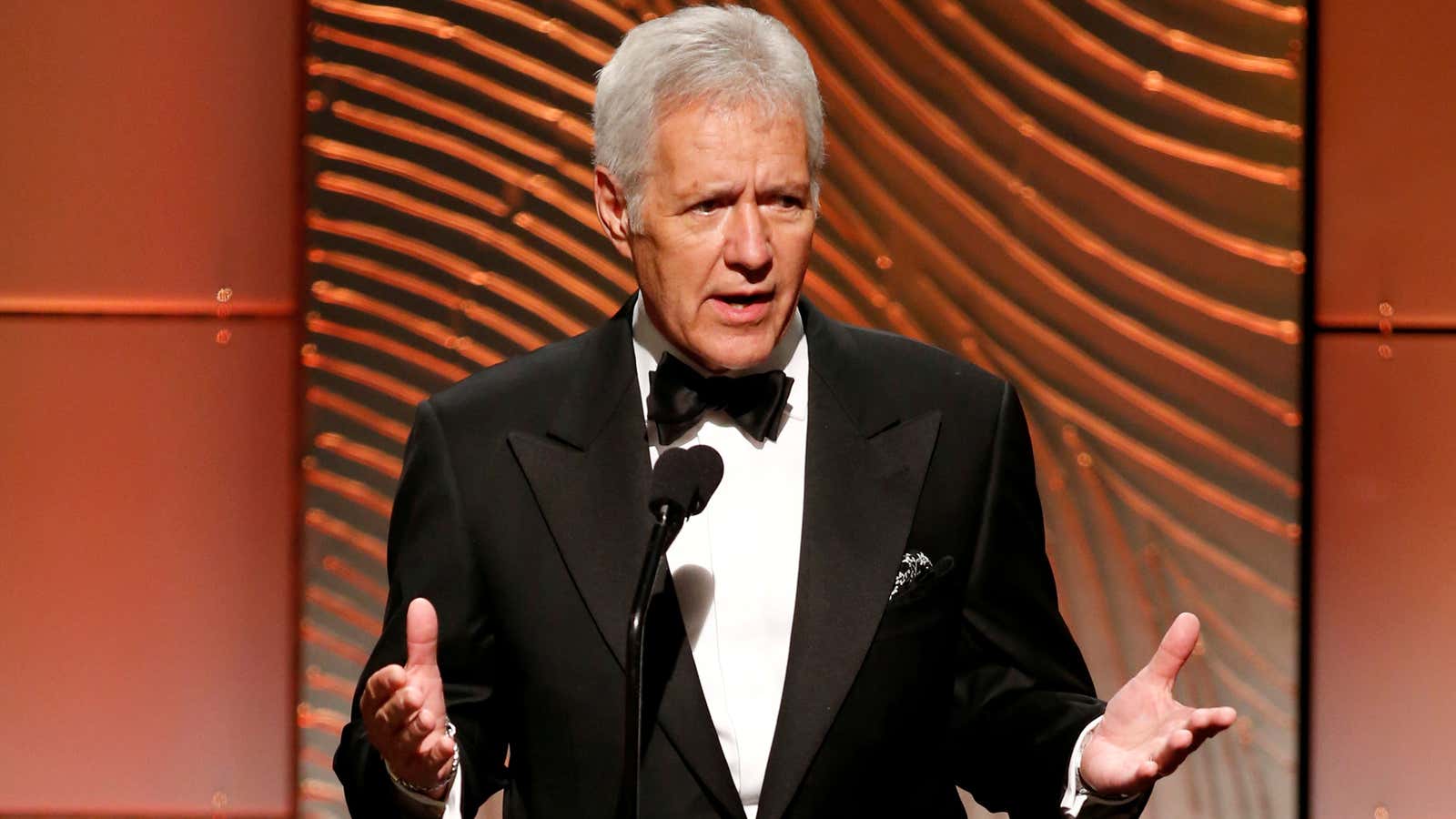Alex Trebek, who hosted the popular TV game show Jeopardy! for 36 years, died over the weekend at the age of 80 from pancreatic cancer. Known for his calming presence and wit, Trebek’s unassuming disposition belied the fact that he was partly responsible for one of the most lucrative television enterprises the world has ever known.
Jeopardy! is among the several long-running TV shows that became hugely profitable through syndication. Syndicated programs are leased directly to TV stations for broadcast, rather than produced for a specific network (or, increasingly, a streaming service). Sony Pictures Television, the studio that produces Jeopardy!, makes $125 million in profit each year from the program and Wheel of Fortune, another game show it owns, according to the Hollywood Reporter. The bulk of that is from licensing fees and advertising sales.
Syndicated shows can be so profitable because they’re often cheap to produce, especially game shows like Jeopardy! that film several episodes a day, and have episodes banked and ready to air months in advance. (That came in handy this year during the pandemic.) For instance, in 1988, four years after Trebek became the host of the show, Jeopardy! cost $5 million to produce every year but generated $50 million in revenue, the Los Angeles Times reported then.
But Jeopardy! was not always destined for success. After starting as a daytime show in the 1960s, it struggled as it shuffled time slots numerous times in order to attract new demographics. It was canceled in 1975, revived in 1978, and promptly canceled again in 1979.
Then came Trebek in 1984, who, at the recommendation of Lucille Ball, was hired by producer Merv Griffin to host a nighttime, syndicated reboot of the show, which continues to this day. It quickly became a hit. Profits for King World Productions, the company that owned the show’s syndication rights at the time, grew more than 400% in the year after Trebek joined, TVWeek reported in 2007. CBS bought King World for $2.5 billion in 1999.
Jeopardy! has averaged about 10 million viewers every night for the past several years, making it one of the top two syndicated programs on TV next to the daytime courtroom show Judge Judy. (Judy Sheindlin, the eponymous adjudicator, has launched an empire of her own: Forbes estimates she is worth over $400 million.) Earlier this year, the Jeopardy! “Greatest of All Time” tournament garnered 15 million viewers per episode—more than the 2019 NBA Finals.
The secret sauce for Jeopardy!—the reason why it has remained so popular for decades while other game shows fizzle out—has been its consistency. Shows that can demonstrate they’re cost-effective over a long period of time, as Jeopardy! has done with Trebek leading the way, can command the biggest licensing fees. It’s not difficult to draw a straight line from Trebek’s universally beloved presence on the show to massive windfalls for all parties involved, including the advertisers who have relied on the show for decades.
“If you get past year three, the odds are good you are going to go to year 10 and if you get to year 10, you’ll be around forever,” former Jeopardy! executive producer Harry Friedman told the telecommunications magazine Broadcasting & Cable last year.
CBS Television Distribution, which handles the distribution rights to Jeopardy!, decided to renew its deal with ABC-owned TV stations in 2018 despite getting a better offer from Fox-owned stations because it didn’t want audiences to have to re-learn where to watch the show, Variety reported. Its appeal to audiences—and to advertisers—is that Jeopardy! has hardly changed at all in 36 years.
That will now be put to the test. Jeopardy! would not have become what it is without its steely, sardonic, longtime host and figurehead. He helped create one of TV’s unassailable success stories—a simple quiz show that has thrived through every economic downturn, every sweeping industry change, every form of new competition over four decades. But in a world without Alex Trebek, Jeopardy! will have to find a different answer.
